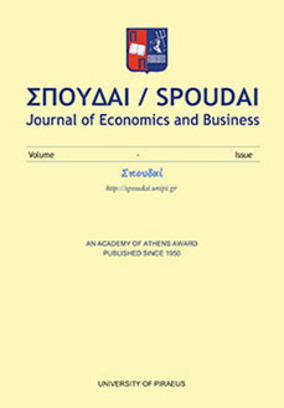International Dock Work Conventions in the era of post-globalization
Part of : Σπουδαί : journal of economics and business ; Vol.64, No.1, 2014, pages 5-15
Issue:
Pages:
5-15
Abstract:
The part of the port industry that serves international trade flows, competes and satisfies demand with global characteristics. Port services production and supply, within an open market, can only be governed by global regulations, and should be taken into account by those who wish to implement them. International organizations influence both safety aspects and the protection of professional life from new working methods in ports. Assessing the importance of labor factor in ports, it is argued that it constitutes a key factor in port production. Several factors have facilitated the gradual substitution of port manual labor, leading to changes in both requirement in skilled labor quantity, but also labor skill and quality requirements. Studying the three I.L.O. conventions pertaining to dock work (C032, C137 and C152) we argue that they can form a positive model for the integration of work rules on a global scale. Main aim of these conventions is the mutual development for all port stakeholders and prevention of unfair competition. We assess the current state of acceptance and degree of implementation of the Conventions by national governments, and argue for the mutual benefits for port stakeholders arising from their implementation, from the perspective of globalization governance, in the era of post – globalization.
Subject:
Subject (LC):
Keywords:
ILO conventions, port labor, dock work, global regulations
Notes:
Περιέχει πίνακες και βιβλιογραφία
References (1):
- Brooks, M., Schnellinck T. and Pallis, A.A., 2011. A systematic approach for evaluating porteffectiveness, Maritime Policy and Management, 38:3, 315-334Chlomoudis, C.I and Pallis, A.A., 1998. Ports, Flexible Specialisation, and EmploymentPatterns, Proceedings of the /_8th World Conference on Transport Research, Antwerp,(CD-Rom), Belgium, July 1998.Chlomoudis, C.I. and Pallis, A.A., 1999. Adjusting Port Management and Organisation toNew Technologies, Proceedings of the Conference on Decision Science and Info Systems:Integrating Technology and Human Decisions: Global Bridge into the 21st Century,Athens, Greece, July 1999.Chlomoudis, C.I., 2006. Port Planning in the Modern Port Industry, J&J, ISBN: 9608461499,Piraeus, GreeceChlomoudis, C.I. and Pallis, A.A., 1997. Investment policies in ports’ infrastructure in theperspective of the European shortsea shipping networks: The Case of Greece. In: Peeters,C. and Wergeland, T. (Eds) (1997), “European Shortsea Shipping”, pp. 315-335, Delft:Delft University Press.Coto-Millan, P., Banos-Pino, J. and Rodriguez-Alvarez, A., 2000. Economic Efficiency inSpanish Ports: Some Empirical Evidence, Maritime Policy and Management, 27(2), 169-74Cullinane, K., Song, D. W., and Gray, R., 2002. A stochastic frontier model of the efficiencyof major container terminals in Asia: assessing the influence of administrative andownership structures. Transportation Research Part A: Policy and Practice, 36(8), 743-762.Cullinane, K., Song, D. W., & Wang, T., 2005. The application of mathematical programmingapproaches to estimating container port production efficiency. Journal of ProductivityAnalysis, 24(1), 73-92.Cullinane, K., & Wang, T., 2010. The efficiency analysis of container port production usingDEA panel data approaches. OR Spectrum, 32(3), 717–738.Estache, A., Gonzalez M., and Trujillo L., 2002. Efficiency Gains from Port Reform and thePotential Yardstick Competition: Lessons from Mexico, World Development 30(4), 545-60.Gonzalez, M.-M., and Trujillo L., 2008. Reforms and Infrastructure efficiency in Spain’scontainer ports, Transportation Research Part A Vol.42, 243-257Gonzalez, M.-M., and Trujillo, L., 2009. Efficiency Measurement in the Port Industry: ASurvey of the Empirical Evidence”, Journal of Transport Economics and Policy, Vol.42.157-192.Kostagiolas, P., and Chlomoudis, C., 2011. Quality and Safety Management in MaritimeTransportation: Importance of Information Services to the new challenges of MaritimeEconomy, Athens, Papazisis PublicationsNotteboom, T., Coeck, C., amd Van Den Broeck, J., 2000. Measuring and explaining therelative efficiency of container terminals by means of Bayesian stochastic frontier models.Maritime Economics & Logistics, 2(2), 83-106.Notteboom, T., 2010. Dock Labor and port- related employment in the European SeaportSystem: Key factors to port competitiveness and reform, ESPOPigenet, Μ., 2012. Labor and trade union cultures: the idiosyncratic experience of theEuropean dockworkers in the 19th to the 21th century, European Review of Labour andResearchPallis, A. et al., 2013. Reforming Port Labour: Challenges to the ratification of ILO PortLabour Conventions in Greece, IAME 2013 Conference, July 2-5 Marseille, France, PaperID 233.Tongzon, J., 1995. Determinants of Port Performance and Efficiency, Transportation ResearchPart A, Vol.29A, No3, 245-252Trujillo, L., and Tovar, B., 2007. The European Port Industry: An Analysis of its EconomicEfficiency, Maritime Economics and Logistics, 9, 148-171Sachish, A., 1996. Productivity Functions as a managerial tool in Israeli ports”, MaritimePolicy and Management, 23, no.4, 341-369.Sánchez, R. J., Hoffmann, J., Micco, A., Pizzolitto, G. V., Sgut, M., & Wilmsmeier, G., 2003.Port efficiency and international trade: port efficiency as a determinant of maritimetransport costs. Maritime Economics & Logistics, 5(2), 199-218.Yuen, C-L A., Zhang A., Cheung W., 2012. Port competitiveness from the users’ perspective:An analysis of major container ports in China and its neighboring countries, Research inTransportation Economics 35, 14-40I.L.O., 2011. Draft ILO. Guidelines on training in the port sector [Online] available at:www.espo.be/publications/studies , www.ilo.org/global/standards.




